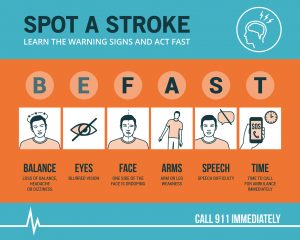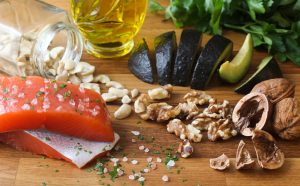
Knowing these signs and symptoms of stroke can help save a life; perhaps even your own.
I’m sure you have heard many times before how exercising is great for keeping your heart strong. Therefore, it may come as no surprise that exercise has been found to prevent complications after someone has a stroke.
What is a stroke?
A stroke is essentially a brain attack of which there are two major types.
A hemorrhagic stroke occurs when a weakened blood vessel bursts. An ischemic stroke is caused by restricted blood flow to the brain as a result of a vessel being blocked.
According to the National Stroke Association, these brain attacks are the fifth leading cause of death in America and one of the leading causes of adult disabilities in the country. Unlike what was previously though, it is estimated that 80-percent of strokes can be prevented by such controllable lifestyle factors as:
- Eating a healthy diet. To consume a heart and brain healthy diet, you can:
- Limit saturated fats in the diet such as those from fatty meats, whole fat dairy products, and fried foods.
- Limit sodium in the diet to 2300 milligrams a day. You can limit sodium by reducing the amount of processed food products you consume each day. Try to limit intake of high sodium foods such as canned soups, chips, deli meats, and adding salt to your food.
- Limit added sugars at meal and snack time. Try to stick to foods that contain less than 15 grams of sugar per serving and limit intake of sugary drinks such as juice, cola, milkshakes, and dessert coffee drinks.
- Stay active. Exercise at least 30 minutes a day for 5 days a week. This doesn’t mean you have to attend boot camp classes. Just walking at a brisk pace is enough to keep your heart strong.
- Limit alcohol intake. For healthy living, you should consume no more than 1 standard drink a day for women and no more than 2 standard drinks a day for men. Alcohol has been associated with increased blood pressure, which can increase risk of stroke. One standard drink is equal to 12 ounces beer, 5 ounces wine, or 1.5 ounces liquor.
- Quit smoking or don’t start. Smoking constricts the blood vessels, therefore restricting blood flow to the organs and tissues.
- Visit your doctor regularly. You and your healthcare provider should work to control any chronic conditions such as high blood pressure, high cholesterol, or diabetes since these conditions can increase your risk of having a stroke.
Exercise and stroke
In the journal Neurology, researchers followed individuals with no history of stroke for 12 years. Over 7-percent of those individuals suffered a stroke and survived during the course of the study. It was found that three years after this major health event, survivors who had exercised regularly before their stroke were 18 percent more likely to be able to perform basic tasks such as bathing themselves. Furthermore, those individuals who were more fit were 16 percent more likely to be able to perform more complex tasks, such as managing money on their own, compared to those who did not exercise.
Surprisingly, a person’s body mass index, or estimate of fat mass, was not a predicting factor in their level of disability after having a stroke. Therefore, it is suggested that doctors should stress the importance of leading an active lifestyle for not only prevention of the condition, but also to improve chances of survival if a stroke occurs.
Another way to help prevent stroke is to take a heart healthy supplement such as Circova by Vita Sciences. Circova contains a powerful blend of Hawthorne extract which has been found to assist in the dilation of blood vessels, in turn increasing blood flow to the heart.
Visit the National Stroke Association website for more information on how you can prevent stroke.
-Staci Gulbin, MS, MEd, RD, LDN
Sources:
National Stroke Association (accessed 2017 April 10) “What is Stroke?” http://www.stroke.org/understand-stroke/what-stroke
Preidt, R. (2017 April 5) “Fitness, Not Fat, Is Key to Post-Stroke Recovery” https://medlineplus.gov/news/fullstory_164476.html
 risk of heart attacks and death by taking niacin with cholesterol-lowering medicine. Beets, beef liver, tuna, salmon, sunflower seeds, and peanuts all contain niacin. When taken as a supplement, however, keep intake levels below the upper limit of 50 milligrams. Otherwise, dangerous side effects such as liver damage and stomach ulcers may occur. However, niacin is a water-soluble vitamin excreted in the urine daily. Therefore, a person is unlikely to overdose on niacin.
risk of heart attacks and death by taking niacin with cholesterol-lowering medicine. Beets, beef liver, tuna, salmon, sunflower seeds, and peanuts all contain niacin. When taken as a supplement, however, keep intake levels below the upper limit of 50 milligrams. Otherwise, dangerous side effects such as liver damage and stomach ulcers may occur. However, niacin is a water-soluble vitamin excreted in the urine daily. Therefore, a person is unlikely to overdose on niacin.